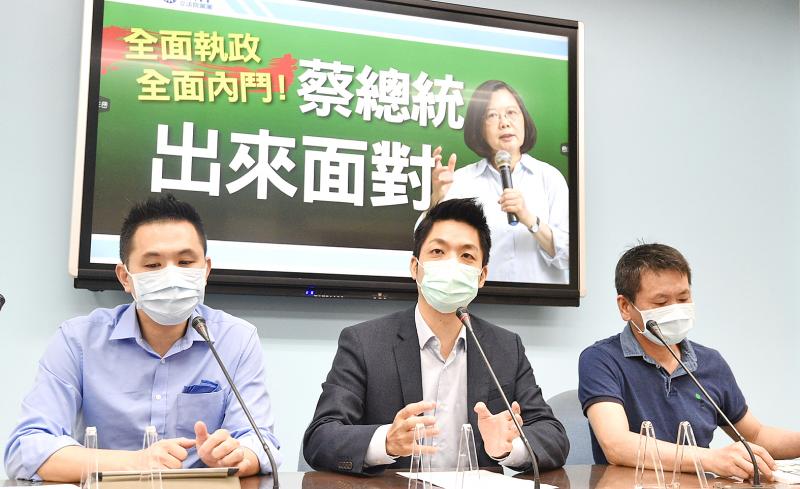The Chinese Nationalist Party (KMT) yesterday called on the Democratic Progressive Party (DPP) administration to explain its alleged intervention in personnel appointments at independent agencies as suggested in files sent to the media in a suspected cyberattack on the Presidential Office.
Until there is a clear explanation from the government, KMT lawmakers would not approve the DPP administration’s nominees for those positions, the party caucus told a news conference.
Media reports of an alleged cyberattack on the Presidential Office on Friday said that an e-mail account named “ser lo” sent some members of the media on the office’s contact list files purporting to be related to the Cabinet member selection for President Tsai Ing-wen’s (蔡英文) second term, including an assessment report on vice president-elect William Lai (賴清德) from early last year, when he ran against Tsai in the DPP’s presidential primary.

Photo: George Tsorng, Taipei Times
If information in the files is true, the DPP was interfering with personnel appointments at independent agencies, and “undermining the state systems,” KMT caucus secretary-general Chiang Wan-an (蔣萬安) said.
Presidential Office spokesman Alex Huang (黃重諺) yesterday said that the files were neither official nor confidential documents, and that the information had been altered and was incorrect.
The Criminal Investigation Bureau has begun an investigation into the doctored files, and the Presidential Office’s cybersecurity and national security teams are probing whether cybersecurity infrastructure or office members were to blame for the incident, he added.
The files were possibly leaked by perpetrators who directly hacked the Presidential Office’s intranet — a “less likely” situation — or perpetrators who hacked the personal computers or e-mails of Tsai’s close aides, or people from the office launched the cyberattack on Tsai’s close aides through a third person, Chiang said.
However, there is a chance that the DPP leaked the files itself, which — if true — would suggest that the party is engaged in a political struggle, and that appointments for the new Cabinet are based on factions, not an individual’s merits, Chiang said.
KMT caucus whip Lin Wei-chou (林為洲) said the suspected cyberattack is tantamount to the Taiwanese version of the US’ Cablegate in 2010, and that the leaked files not only revealed the internal conflicts among DPP members, but also the party’s “appalling” infringement upon the autonomy of independent agencies.
If not presented with a full explanation, KMT lawmakers would not approve the DPP’s nominees for positions in the Transitional Justice Commission, the National Communications Commission, the Examination Yuan and the Control Yuan, Lin said.
KMT Legislator Charles Chen (陳以信), a former presidential office spokesman, said that the alleged cyberattack exposed the large loopholes in the nation’s cybersecurity.
It would be a grave situation if the office’s intranet was infiltrated, as not only Tsai’s communication records, but also confidential files regarding the military and national policies would be at risk, he said.
If the extranet were infiltrated, it would indicate that someone from the office had failed to comply with data protection regulations, which would call for punishment, Chen said, adding that if people from the Presidential Office leaked the files, then the “moles” must be held accountable for “betraying the nation.”
Although the Presidential Office has added the position of chief information security officer, and the DPP administration has established the Security Operation Center as part of efforts to enhance the nation’s data protection, their effectiveness is anything but ideal, he said.
KMT Chairman Johnny Chiang (江啟臣) said that the DPP government needs to be honest and clarify whether the alleged cyberattack was due to a flaw in cybersecurity or national security, or party infighting.
Additional reporting by Chen Hsin-yu and Su Yung-yao

POSITIVE DEVELOPMENT: Japan and the US are expected to hold in-depth discussions on Taiwan-related issues during the meeting next month, Japanese sources said The holding of a Japan-US leaders’ meeting ahead of US President Donald Trump’s visit to China is positive news for Taiwan, former Japan-Taiwan Exchange Association representative Hiroyasu Izumi said yesterday. After the Liberal Democratic Party’s landslide victory in Japan’s House of Representatives election, Japanese Prime Minister Sanae Takaichi is scheduled to visit the US next month, where she is to meet with Trump ahead of the US president’s planned visit to China from March 31 to April 2 for a meeting with Chinese President Xi Jinping (習近平). Japan and the US are expected to hold in-depth discussions on Taiwan-related issues during the

‘LIKE-MINDED PARTNER’: Tako van Popta said it would be inappropriate to delay signing the deal with Taiwan because of China, adding he would promote the issue Canadian senators have stressed Taiwan’s importance for international trade and expressed enthusiasm for ensuring the Taiwan-Canada trade cooperation framework agreement is implemented this year. Representative to Canada Harry Tseng (曾厚仁) in an interview with the Central News Agency (CNA) said he was increasingly uneasy about Ottawa’s delays in signing the agreement, especially as Ottawa has warmed toward Beijing. There are “no negotiations left. Not only [is it] initialed, we have three versions of the text ready: English, French and Mandarin,” Tseng said. “That tells you how close we are to the final signature.” Tseng said that he hoped Canadian Prime Minister Mark Carney

President William Lai (賴清德) yesterday bestowed one of Taiwan’s highest honors on Saint Vincent and the Grenadines (SVG) Ambassador Andrea Clare Bowman in recognition of her contributions to bilateral ties. “By conferring the Order of Brilliant Star with Grand Cordon on Ambassador Bowman today, I want to sincerely thank her, on behalf of the Taiwanese people, for her outstanding contribution to deepening diplomatic ties between Taiwan and SVG,” Lai said at a ceremony held at the Presidential Office in Taipei. He noted that Bowman became SVG’s first ambassador to Taiwan in 2019 and

A man walks past elementary school artworks at the Taipei Lantern Festival in Ximen District yesterday, the first day of the event. The festival is to run from 5pm to 10pm through March 15.